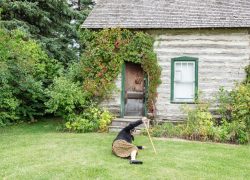 Slips and falls are an unfortunately common injury in and around the home. For that reason, many homeowners question whether or not someone who falls and injures themselves on their property can hold the homeowner liable.
Slips and falls are an unfortunately common injury in and around the home. For that reason, many homeowners question whether or not someone who falls and injures themselves on their property can hold the homeowner liable.
The amount of potential liability depends heavily on the legal status of the person who fell and was injured on your property.
When familiarizing yourself with slip and fall injuries on your property, pay attention to a term called premises liability.
Premises liability is coverage that protects a person from liability in the event of an accident like a slip and fall on someone else’s property. In order for a property owner to be held liable for an injury on their property, the incident must meet specific criteria.
Liability can occur when one or more of the following happen:
- The property owner created dangerous conditions that contributed to the accident occurring
- The property owner was aware of an existing dangerous condition on the property and failed to take action to correct it
Not all guests on a property are treated equally. The legal status of the visitor plays an important role in the level of potential liability resulting from an accident.
- Invitee: This is a person who was invited to the property, such as a customer in a retail establishment
- Licensee: A person who enters a property as a social guest or for their own purpose. A licensee enters a property with the property owner’s consent
- Social Guest: Someone who is welcomed onto the property by the property owner
- Trespasser: A person who enters a property with no right or permission to do so
Judges and juries are able to determine if the property owner was prudent in ensuring their property was free of hazards prior to, and during the time the injured party was on the premises. Not only can liability apply to property owners, but renters can be held accountable under the same guidelines as well.
Determining factors to liability include:
- How the property was being used at the time of the accident
- The conditions under which the injured party entered the property, as well as their legal status
- The likelihood that the property owner or renter would have noticed the dangerous condition, as well as if it was reasonable to expect them to take action to correct the condition
- Whether it was foreseeable that the injury was going to occur
Whether someone slips and falls on your residential or commercial property, it is crucial to choose representation that holds your best interests at heart and will do what it takes to reach a favorable outcome. For more information about our services, or to schedule a consultation, contact the BCN Law Firm in Clermont today at 352-394-2103.
